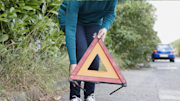What is car insurance excess?
What to do if you are involved in a car accident

Thanks to improvements in vehicle safety, car accidents don’t happen very often. But if you’re one of the unlucky ones, it’s good to know what to do.
Figures from the Department for Transport show how much safer our roads are now. In 2022, there were 106,004 reported accidents on Britain roads – nearly 20% lower than in 2017, when 129,982 accidents were reported.
A key factor in this reduction is that our cars are now smarter, with advanced driver assistance systems such as adaptive cruise control and lane departure warning helping to make the roads safer.
Thatcham Research (the people responsible for testing vehicle safety) says that vehicles fitted with electronic stability control, which prevents you losing control in a skid and is mandatory on new cars since 2012, are 25% less likely to be involved in a fatal accident.
Although there are fewer collisions on our roads, they do still happen. Here’s what you need to know if you get caught up in one.
Reporting an accident
First, stop as soon and as safely as you can. Turn off the engine and if necessary put on your hazard lights.
Even the smallest accidents can be a shock so take a minute to calm down, assess the situation and make sure everyone is ok. If anyone is injured or the road is blocked, you will need to contact the police and the ambulance service. Call 999 or 101, depending on the situation.
You should also contact the police if you are concerned the other driver has no insurance, they are under the influence of drink or drugs, or they refuse to give you their details.
Exchanging details
It’s also important to exchange information with anyone else involved in the accident. This is a legal requirement and necessary for an insurance claim.
You should share your personal details, including your name, address and phone number, as well as the make, model and registration number of your vehicle. Insurance details need sharing too, including the insurer’s name and the policy number if you have it.
Collecting information
As well as exchanging details, it’s good to collect as much information from the accident scene as possible. This might include details for any witnesses and other people involved. It may also be information about the accident, such as the nature of the damage and the road conditions. Photos and dash cam footage can be helpful too.
Telling your insurer
You should report any accident to your insurer, even if you’re not planning to make a claim. If you do want to make a claim, your insurer will want to know what happened plus details of anyone else involved. They will also be able to explain the next steps in your claim.
Your car insurance policy will specify how long you have to report an accident. This varies between insurers from a day to a couple of weeks, so check your policy.
A claim and your cover
Having to make a claim on your insurance can affect your future premium. This will depend on factors such as who was at fault and whether your no claims bonus was protected. Your insurer will be able to explain the potential implications when you make a claim.
You may also want to check your cover for accidents caused by uninsured drivers. Co-op Insurance offers an uninsured driver promise on its comprehensive policies.
With this, following an accident that is the fault of an uninsured motorist, we will refund the cost of your excess and restore your no claims discount. You must be able to provide the vehicle registration, colour, make and model as well as the uninsured driver’s details.
Knowing what to do if you are involved in a car accident can make the experience much less stressful. Visit our car insurance page to find out more about the cover we offer.
Exclusive offers for Co-op Members

Car insurance
Exclusive member price on car insurance.
Your discount is applied if your details match those on our membership database and is not available on add ons.





